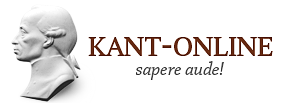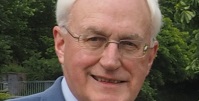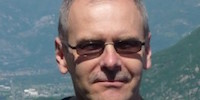N. Dmitrieva. Kant`s philosophy through the prism of Russian neo-kantianizm: On the Problem of Self-Identity of Russian Neokantian Schools
The problem of historico-genetic connections and affiliation of ideas is one of the most controversial in the history of Russian philosophy. All the attempts made to solve this problem give rise to contradictory judgments ranging from the statement that Russian philosophy is undoubtedly original to the denial of all originality in Russian philosophical thought and of its independence from Western models. The difficulties in choosing the principle of historical analysis of Russian philosophy have their roots in the subject of analysis, that is to say, in the extreme diversity of ways and tendencies developed by Russian philosophical discourse. In this quite wide spectrum of ideas Kantian critical tradition has taken a firm place and determined the specific character of the whole epoch, that is, the Silver Age in Russian culture. Most researchers recognize Kantian influence on Russian philosophical thought. Therefore, I propose to regard the analysis of this influence as the paradigm for the subsequent historico-philosophical comprehension of Russian philosophy on the whole. Hereinafter I would like to reveal the efficacy of the “genetic” analysis to clarify the gist of the intellectual adoption process and its Russian peculiarity.
Slavophils, Westernizers and, of course, Vladimir Soloviov have often adverted to Kant. Thus, they have paved the way for the apprehension of Kantian ideas in Russia. However, they have begun by inspiring only an intellectual fashion: Kant’s name has become very famous and his works very quoted – not only by the Russian Neokantians but also by other thinkers, writers and publicists. In this respect, one can notice a certain parallelism and synchronism between the philosophical process in Germany and Russia. Nonetheless, the fashion has not lasted, and as a result the attitude towards Kant and Neokantians has changed. Here the most striking example is Andrej Belij. In 1904 he announced: “We, symbolists, conceive ourselves as the legitimate children of the philosopher of Königsberg” [5, 3] and in 1908 he invited all the “decadents, symbolists and mystics” “to apprentice” themselves “to Cohen and Natorp in Marburg or in Freiburg” [9, 41]. In 1911, however, Kant had already became for him “the dumbness in the mask of words: the wicked mask” [8, 241], and in 1912 Belij referred to the Neokantian movement as an “idiocy” [6, 51-73].
The radical changing of intellectual points and the difficulties in the reception of Kantianism by the Russian scientific community can be explained, first and foremost, by the specificity of Russian reality itself. On the one hand, there has been no unified and lasting philosophical tradition, that is, a tradition that could have provided the productive discussion of general philosophical problems by the representatives of different intellectual movements. On the other hand, it has been necessary to revise the Orthodox Church dogmata, which were fetters for the development of freedom of thought. Yet, on criticizing these dogmata the Russian thinkers have opted for building one more speculative castle with Christian mythology rather than substantiating a rational renouncement of these dogmata. As is well known, the Neokantian movement has aimed at defending the rationalist tradition and philosophical criticism; therefore, this movement had to fight hardly to make its way through Russian scientific community. Needless to say, the reflexive Protestant “subjectivism” has come into collision with ontological orthodox “sobornost”. This context has conditioned a noticeably distorted interpretation and a hostile attitude towards Neokantian disciples.
At the beginning of the 20th century several Russian thinkers have definitely marked their philosophical position as Kantian and critical. The “elder” generation of these thinkers, which included A. Vvedenski, G. Chelpanov and I. Lapshin, has directly relied on Kant for constructing their conceptions. They have considered themselves to be his followers, proposed more or less successful interpretations of his philosophical system and at the same time kept aloof from the representatives of Neokantian schools [1, 227-228].
The “younger” – neokantian – generation of critical philosophers in contrast to the Kantians has sought and found (although not without the help of their tutors from Marburg and Baden or Freiburg) in Kant’s doctrine the possibility to comprehend and ground philosophically the progress of modern science, firstly that of mathematics and natural science, but also that of historical science and humanities. This was an ambitious philosophical venture whose accomplishment required an improved methodology and a reformed system of categories.
Both Kantians and Neokantians have acknowledged that Kant’s system is “a school of philosophical thought”. However, while Kantians have confined themselves to this new scholasticism and worshipped the letter of Kant’s doctrine, Neokantians have maintained that the school – as W. Saval’ski said – “should provide nothing but the foundations and a general direction, consisting in the methods and standpoints that should be subsequently applied to address the modern issues of our century and our time” [15, 6-7].
After their return from Marburg and Freiburg, Russian Neokantians have inspired various philosophical associations, which differed markedly in status and significance and represented an attempt to create philosophical schools similar to those existing in Germany. One can identify several principles according to which Neokantian schools organized and functioned in Germany. The first is “the formation of understanding” (die Bildung des Verstandes) or “Enlightenment” (Aufklärung) understood in the Kantian sense as the assimilation of intellectual culture in order to develop further original philosophizing. It can be clearly expressed by Kant’s appeal: “Sapere aude!” (Dare think!). The second principle concerns the realization of a definite scientific program capable of supporting and developing the classical philosophical tradition. Finally, other characteristics might be mentioned like the permanent and free scientific interaction emerging as a dialogue or polemics; the internationalism regarded as a privileged opportunity for representatives of different countries and different cultural traditions to “study”; the principle of openness as the condition for the development of a philosophical school and the appearance of new philosophical conceptions from their depths.
One of the first philosophical schools in Russia was the seminar of P. Novgorodtsev at Moscow University. His student Nikolaj Alekseiev has recalled that Novgorodtsev “was a real teacher thanks to his wide erudition, his skill to teach how one should work scientifically, and his moral authority for students. Philosophically at that time he was a Kantian closely related with Windelband’s Heidelberg school. Nevertheless, Novgorodstev’s “school” was remarkable for its broad tolerance. He was able to gather around him materialists and sceptics and empirical criticists and Hegelians – if only they were philosophers” [2, 74]. Thanks to these circumstances there were remarkably different thinkers coming from this school as W. Saval’ski, I. Il’in, N. Alekseiev, B. Vysheslavtsev. Following his advice all of them have studied at Neokantian centers in Germany but only Saval’ski has restricted himself to a Neokantian position. Even Novgorodtsev at the end of his life refused Neo-Kantianism in favor of orthodox mysticism of a Eurasian blend.
The next example of an officially avowed scientific school was the seminar of A. Lapo-Danilevski at Saint-Petersburg University, which lasted since 1887 till 1919 and was devoted to the methodology of history and the philosophy of Kant and Hegel.
Another well-known philosophical association was the group of thinkers formed around the magazine “Logos”. Its main participants were two Russian disciples of Baden school, F. Stepun and S. Hessen, but B. Jakovenko is also worth referring, he who has been close to the Marburg school and who has named his philosophical conception “ontological pluralistic criticism” [11, 370]. Many Russian Neokantians from different schools have collaborated with them; among others there were B. Kistiakowski, W. Sesemann, G. Gordon, N. Boldyrev, L. Gabrilovich, N. Hartmann, I. Il’in, and M. Rubinstein. Although it has not constituted a formal philosophical school, this group had a unique possibility owing to its own scientific issue – the magazine “Logos”, published between 1910 and 1914. Several reasons can be found for this failure. Firstly, let us underline the absence of a distinct scientific program defined by the editorial staff, and consequently some degree of “pantophagy” in the scope of their research. For example, since they wanted to avoid all possible disagreement with their “closest collaborator”, S. Frank, they decided to publish his rather weak article as they admitted themselves (“Nature and Culture”) [13]. Another reason can be found in their yielding to “the Christian idea”. This attitude has undermined its reputation of a Kantian and critical issue [18, 218]. Finally, it is worth mentioning the option for the popularization that took place in 1914.
The apparition in 1910-1914 of some philosophical societies (in contrast to religious-philosophical ones) was the significant symptom of the gradual strengthening of the positions taken by rationalist philosophy in Russia. The founders of these societies were also disciples of German Neokantian centers. A. Weidemann in 1911 and W. Sesemann in 1914 became the chairmen of the unofficial “Philosophical assembly” in Saint-Petersburg. Concurrently, the “Philosophical circle” gathered at Margaret Morozova’s house. The Moscow society for the study of scientific and philosophical questions was founded in January of 1914 under the direction of N. Alekseiev. Unfortunately, none of these associations set up their own philosophical school. Moreover, the beginning of the First World War interrupted their activity, precisely when a wave of Germanophobia swept over Russian society.
The fate of another school, formed as a “home seminar “, was different. Boris Fogt, who was also a disciple of Marburg school and who was unfairly forced out of the department in Moscow University, and therefore started teaching at home, organized this seminar. Everybody “could find exactly what they sought: just as a pianist trains his fingers so he trained the logic apparatus, he was not concerned with the content of the outlook but demanded accuracy in methodology” [7, 384-385]. In his seminar devoted to Kant and Cohen he applied the principles of philosophizing held by his Marburg tutors. His school worked productively since 1904 till Fogt’s death in 1946. This means that his school managed to survive even in Soviet Russia, though in the conditions peculiar to an intellectual underground group. There is no doubt that the school was non-institutional and unofficial, but the fact remains that among its progeny there were several eminent artistic and scientific personalities, such as Andrej Biely, P. Kopnin, M. Turovskij, J. Levin, A. Chicherin, and B. Ghornung. Before the revolution Fogt had tried to organize a scientific issue similar to “Philosophische Arbeiten” in Marburg. Andrej Biely has recollected that Fogt was hoping for Morozova’s financial support for the edition of the Russian Neokantian magazine. However, “her goodwill to Kant seemed to come to nothing more than Fogt’s report entitled “Kant”. In that point, indeed, old Lopatin has managed to win all philosophers over to the other trend” [7, 505 – 506]. Nevertheless, Fogt tried to fulfill his project in a different way. Thus, in 1906 he founded the scientific series called “Kantiana”. It was conceived as a manual for the study of Kant’s philosophy and should have been used as textbooks for preliminary study of philosophy. There were two issues, namely the translation of Carl Stange’s “Der Gedankengang der “Kritik der reinen Vernunft”. Einleitfaden für die Lektüre” and of Johann Schulze’s “Erläuterungen zu Kants Kritik der reinen Vernunft”. Unfortunately the edition activity was ephemeral. Two other issues (the translations of Alfred Hölder’s “Darstellung der Kantischen Erkenntnisstheorie mit besonder Berücksichtigung der verschiedenen Fassungen der transcendentalen Deduction der Kategorien” , and of Hermann Cohen’s “Kommentar zu Immanuel Kants Kritik der reinen Vernunft”) were expected in 1914 but they did not appear. Instead, there were some more translations by Fogt at that point, among them the translation of Kant’s “Grundlegung zur Metaphysik der Sitten”, and of P. Natorp’s “Gesammelte Abhandlungen zur Sozialpädagogik” and “Philosophische Propädeutik”. In spite of its brief history the apparition of this series must not be underestimated. “Kantiana”, in actual fact, appears to have marked the emergence of systematic Kantian study in Russia.
Russian Neokantianism has considerably influenced all the culture of the “Silver Age” [4, 157–198], [10, 6–11, 19–23], and at the same time Russian Neokantians have felt the impact of specific Russian traditions on the comprehension and creative transformation of reality. Many of the Baden and Marburg disciples, who were strongly exposed to these powerful traditions, have rejected their previous philosophical stance and made an effort, in Stepun’s terms, “to inosculate spiritually Russian and Western cultures, and to underpin the intuition and revelation of Russian creative work with the reliable vocational foundation”; consequently “they have tied up at monks” [16, 219, 136].
Few of them, notwithstanding, have tried to retain and confirm their identification with the scientific alma mater. Before the revolution, when the development of Neo-Kantianism had not yet overstepped the limits of its scientific program, the identification of a thinker with a philosophical school was only determined by his personal choice and philosophical education. Among Russian “orthodox” Neokantians one finds N. Hartmann, M. Kaghan, S. Rubinstein, M.Rubinstein, S. Hessen, A. Weidemann, W. Saval’ski, W. Sesemann, and B. Fogt. Close to Neokantians in their philosophical position one can consider K. Jhakov, A. Sakketti and Eug. Borichevski.
After 1918 the transformation of Russian Marburgers’ ideas has followed different paths. If we restrict ourselves to examining the Marburg school, for it can be regarded in particular as a paradigm, then we can observe that for the group of emigrants its transformation was on the way to “ontology”. N. Hartmann and W. Sesemann, both under the strong influence of Husserl’s phenomenological theory, have begun to elaborate, though each of them in his own way, a form of “phenomenological-ontological realism”. This conception was finally developed and converted by Hartmann into the doctrine of “new” or “critical” ontology. Sesemann has plunged into the problems of knowledge and tried to synthesize Marburger’s and phenomenological approach to epistemology. He aimed to uncover the essence of the so-called “non-noumenal” knowledge with “irrational” nature of the perceptible being as its essential feature. In this respect, Sesemann was close to S. Hessen, the disciple of H. Rickert. For his part, in fact, Hessen has offered the original conception of “transcendental-dialectical ontologism”. The pattern and the trend of development of these Russian Neokantian conceptions bear a remarkable similarity to one of the German forms of Neokantian development, specifically that which Heidegger has accomplished under the influence of phenomenological theory in the realm of fundamental ontology.
Oddly enough, none of the Russian Neokantians have chosen the way of Neo-Hegelianism as occurred in Germany in most cases, the only exceptions are Hessen and Weidemann who appear to show some features of dialecticism in their conceptions.
In Soviet Russia, severed from the European philosophical area by its new political borders, several tendencies of transformation have emerged. Let us enumerate some of them. 1) The connection with Marxism which was due to the application of the activity theory approach to the study of consciousness and to the theory of personality (Sergej Rubinstein). In fact, the Neokantian conception of thinking as infinite production or pure activity refers to the Kantian principle of the subject activity, that is, the principle establishing the subjective construction of any knowable object and objectivity in general. 2) The substantiation of the principles for critical personalism (Moisej Rubinstein), according to which life is “the supreme value” in the world and “the supreme category” in philosophy, and its meaning relies only upon “the possibility of the infinite-finite activity” [14, 189]. This leads to the Kantian interpretation of man as “an end-in-itself” passing through the Baden philosophy of value and Natorp’s theory of pedagogics. 3) The “union” with the theory of literature which was achieved by Nevel’s circle with M. Bakhtin and M. Kaghan. 4) The preservation of the earlier Neokantian (Marburg) position as conveyed by B. Fogt’s teaching.
This approach to the possibility of transmission of classical philosophical thought – that has constituted an important moment of Neokantian historico-critical method – highlights the role of Neo-Kantianism as an implicitly determining factor in the setting and settling of some local issues within Marxist theory, namely the logical foundation of scientific knowledge, the putting into scientific circulation of the positively determinate thesis “there is no object without subject”, the rehabilitation of the concept of “idea”, and, on the whole, the spread of an anthropological orientation in philosophical research. The main role in this transformation belongs to Pavel Kopnin who was a disciple of Fogt and later, at the end of 1960s, the head of the Institute of Philosophy in Moscow. His scientific works have announced the beginning of a certain “thaw” in Soviet philosophy. It was in his article of 1965 that he put forward the idea, which implicitly collided with dogmatic Soviet Marxism, that “philosophical categories are always in a certain connection, in a system, which changes with the development of knowledge. Thus, if the level of theoretical knowledge modifies, then a new system of categories with a new content is required” [12, 38]. As far as I can understand this, there is every likelihood that Fogt has suggested such an idea to Kopnin. Indeed, in one of his works Fogt has objected to H.Cohen, who had accused Kant of dogmatism for presenting his table of categories as supposedly complete and definitively accomplished. According to Cohen, it could only aspire to completeness but never fully achieve it, for the new problems arising in science from its development imply necessarily the progress of pure knowledge. Now, just such a character, believed Fogt, is revealed by Kant’s table of categories [10, 79].
All in all, I contend that Neo-Kantianism in Russia has largely outlived its epoch – the epoch of fin de siècle and fore-revolution – and played a role of paramount importance in the history of Soviet philosophy. To sum up, I would like to stress that the definition of the main landmarks in the self-identification process of Russian Neokantian schools proves the efficacy of “genetic” analysis to clarify the gist of an original process of intellectual adoption. However, this analytical work progresses with difficulty, given notably that most writings of Russian Neokantians remain still unpublished or at least not easily accessible. This means that the historico-philosophical science faces an important unsolved cultural problem. Further research may allow us to consider Neo-Kantianism in general and Russian Neo-Kantianism in particular as one of the most significant pages in the history of intellectual movements.
Bibliography:
- Abramov A. O russkom kantianstve i neokantianstve v zhurnale “Logos” [On Russian Kantianism and Neo-Kantianism in the Journal “Logos”]. Kant i filosofiya v Rossii [Kant and philosophy in Russia]. Мoscow: Nauka, 1994.
- Alekseev N.N. V burnye gody. Vospominaniya [In Stormy Years. Memoirs]. Part I. Photocopy. INION [Institute of Scientific Information on Social Sciences]. Moscow.
- Bezrodny M.V. Iz istorii russkogo neokantianstva [On the History of Russian Neo-Kantianism]. Litsa: Biograficheski al’manakh [Persons: the Biographical Miscellany]: I. Moscow; S.-Petersburg, 1992.
- Bezrodny M.V. Iz istorii russkogo germanofil’stva: izdatel’stvo “Musaghet” [On the History of Russian Germanism: Publishing House “Musaghet”]. Issledovaniya po istorii russkoi mysli: Ezhegodnik za 1999 god [Investigations on History of Russian Thought: Year-Book 1999]. Moscow: OGI, 1999.
- Biely A. Krititsizm i simvolizm. Po povodu stoletiya so dnya smerti Kanta [Criticism and Symbolism. On the Occasion of the Centenary of Kant’s Death] // Vesy [Libra]. № 2. 1904.
- Biely A. Krugovoe dvizhenie. Sorok dve arabeski [Circular Motion. Forty-Two Arabesques] // Trudy i dni [Troubles and Days]. №. 3–4. 1912.
- Biely A. Nachalo veka. Vospominaniya [The Beginning of the Century. Memoirs]. In 3 volumes. Vol. 2. Moscow: Khudozhestvennaya literatura, 1990.
- Biely A. Iskusstvo [The Art] Biely A. Symvolizm kak miroponimanie [Symbolism as World-Understanding]. Moscow: Respublika, 1994.
- Bugaev B.N. (Biely A.) Na perevale. XI. Teoriya ili staraya baba [On the Pass. XI. Theory or Old Yap-Woman] // Vesy [Libra]. №. 4. 1908.
- Fogt B.A. Izbrannoe (iz filosofskogo naslediya) [The Selected (from Philosophical Heritage)]. Pref. & comm. by N.A.Dmirieva. Moscow: Progress-Traditsiya, 2003.
- Jakovenko B.V. Istoriya russkoj filosofii [History of Russian Philosophy]. Trasl. from Czech by M.Solodukhina. Moscow: Respublika, 2003. (In Czech: Dejiny Ruske Filosofie. Praha, 1938).
- Kopnin P.W. Razvitie poznaniya kak izmenenie kategorij [The Development of Knowledge as Change of Categories] // Voprosy filosofii [Questions of philosophy]. №. 11. Moscow. 1965.
- Letter from F.Stepun to E.Medtner 21.08.1910. OR RGB (The Department of Manuscripts. Russian State Library). Stock 167. Card 14. Unit of issue. 2. List 5.
- Rubinstein M.M. O smysle zhizni [On the Sense of Life]. Part I. Istoriko-kriticheskie ocherki [Historico-critical Studies]. Moscow, 1927.
- Saval’ski W.A. Osnovy filosofii prava v nauchnom idealizme [Foundations of Legal Philosophy in Scientific Idealism]. Uchenye zapiski Moskovskogo Imperatorskogo universiteta, iuridicheskogo fakul’teta [Academic proceedings of Moscow Imperial University, Department of Law], vol. 33. Moscow, 1909.
- Stepun F.A. Byvshee i nesbyvsheiesya [The Have-Been and the Might-Have-Been]. 2nd ed., rev. S.-Petersburg: Aletheia, 2000.
This article was firstly published in collected articles «Kant zwischen West und Ost»:
Dmitrieva Nina. Kant`s philosophy through the prism of Russian neo-kantianizm: On the Problem of Self-Identity of Russian Neokantian Schools// Kant zwischen West und Ost. Zum Gedenken an Kants 200. Todestag und 280. Geburtstag. Hrsg. Von Prof. Dr. Wladimir Bryuschinkin. Bd.1. Kaliningrad, 2005. S.142 – 151.




